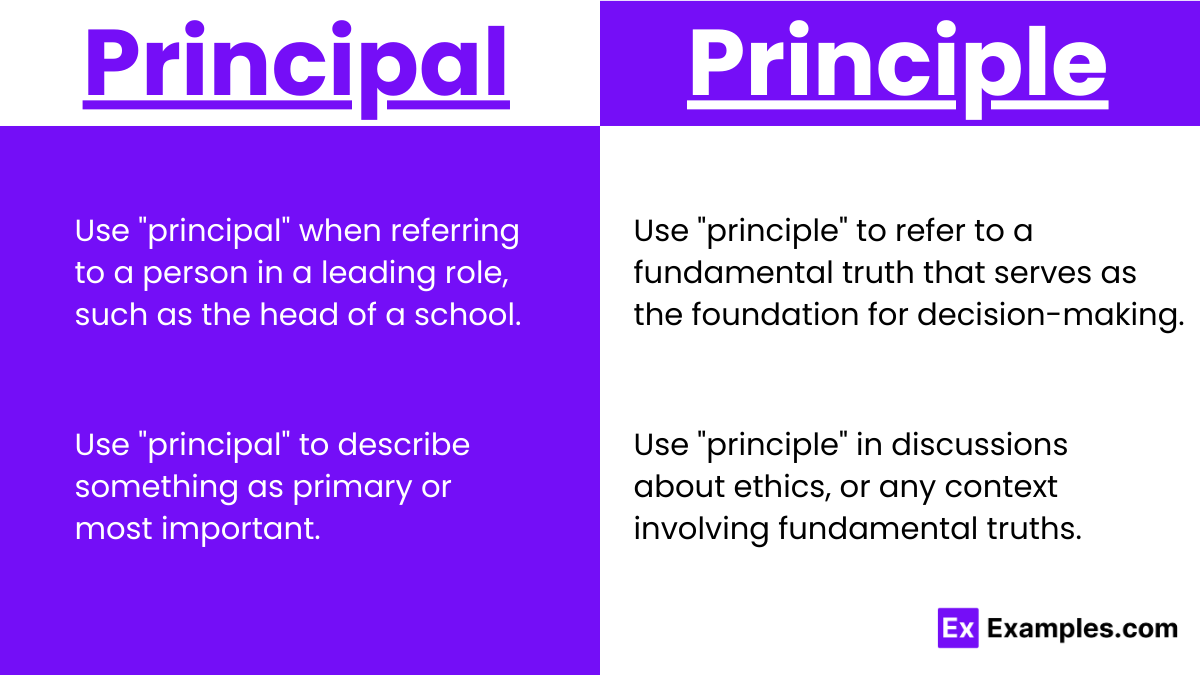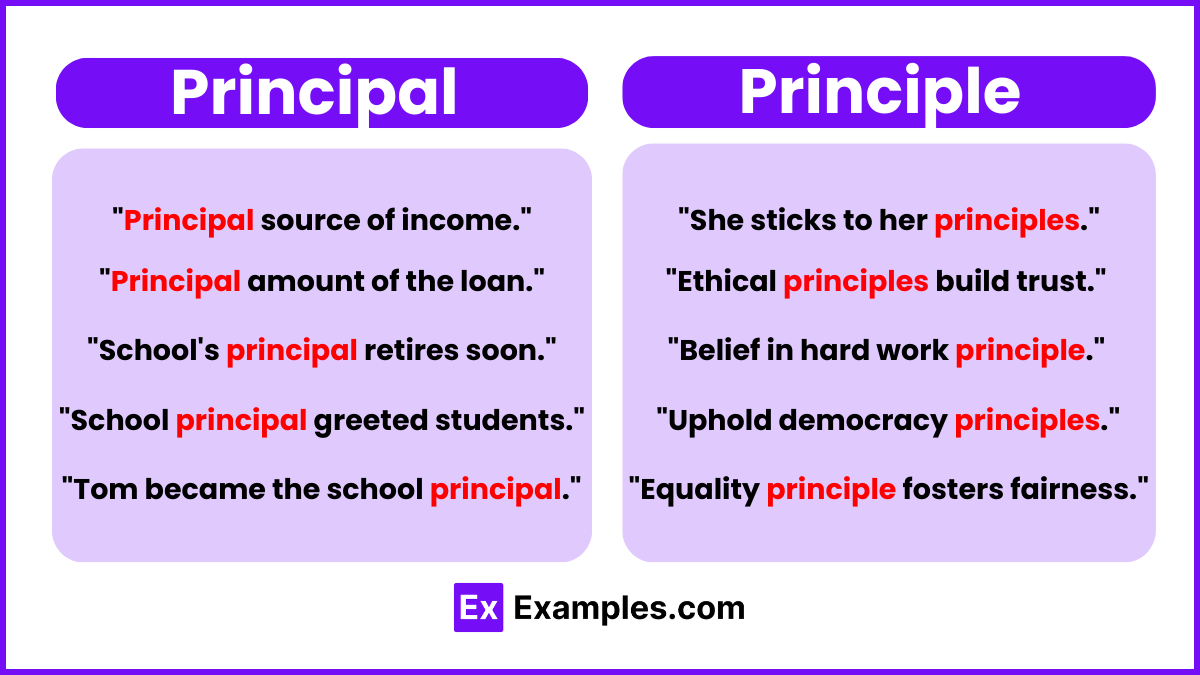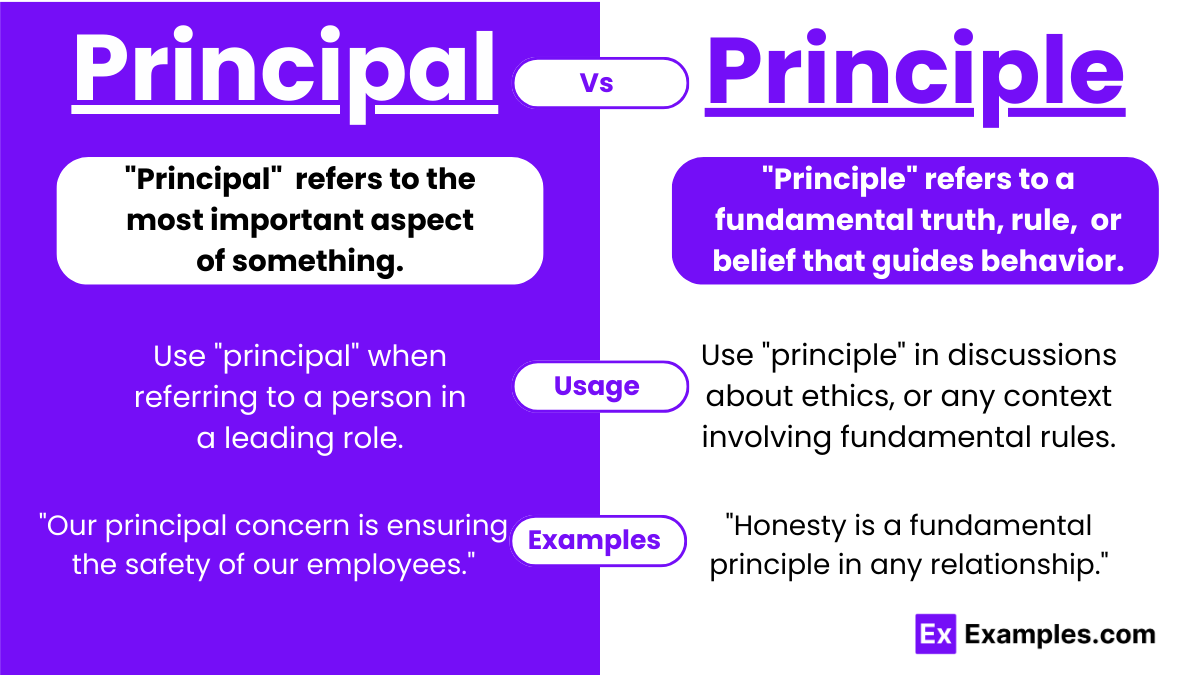Principal vs Principle – Meanings, Differences, Usage, Examples
These words often confuse people. “Principal” as an adjective signifies importance, while as a noun, it refers to a leader or head of an institution. On the other hand, “Principle” only serves as a noun, representing fundamental truths or rules. Remember, your “pal” is the principal! Jump into our examples to master the difference between principal and principle effortlessly.
Principal and Principle – Meanings
- Principal: It can used as both adjective and a noun. It refers to the most important aspect of something. It can represent various concepts based on the context in which it’s used. For instance, as a noun, it could refer to the head of a school, the original sum of money invested or loaned, or as an adjective, it might signify something as primary or foremost.
- Principle: It can only be used as a noun. It refers to a fundamental truth, rule, guideline, or belief that guides behavior or decision-making.It represents a core concept or rule that governs actions or events. Principles often guide ethical conduct, logical reasoning, or scientific understanding.
Summary
How To Pronounce Principal and Principle
- Principal: Pronounced as \ˈprin(t)-sə-pəl / “/ˈprɪn.sə.pəl/” with the emphasis on the first syllable.
- Principle: Pronounced as \ˈprin(t)-sə-pəl\ “/ˈprɪn.sə.pəl/” in English (US) language, also with the emphasis on the first syllable.
Differences Between Principal and Principle
| Aspect | Principal | Principle |
|---|---|---|
| Leadership Role | The head or director of a school or organization | Does not signify a leadership position |
| Financial Context | Refers to the original sum of money invested or loaned, excluding interest | Not associated with financial transactions |
| Context of Use | Commonly found in educational or administrative settings | Often used in ethical, moral, or philosophical discussions |
| Fundamental Aspect | Can represent the primary or most important factor | Represents a fundamental truth or rule |
| Adjective Use | Can be used as an adjective meaning primary or most important | Solely used as a noun, not an adjective |
Tricks To Remember The Differences Between Principal and Principle
- The Pal Principal:
- Associate “principal” with a “pal” who leads, like the principal of a school. This reminds you that “principal” refers to a person in a leading role.
- Fundamental Principle:
- Think of “principle” as fundamental beliefs or rules guiding behavior. The word “principle” itself implies something fundamental or foundational.
- Financial Focus:
- Remember that “principal” often involves money matters. It refers to the original sum of money invested or loaned, excluding interest. So, think of “principal” as your financial “pal.”
- Context Clues:
- Consider the context in which you encounter the words. “Principal” is often associated with education or leadership roles, while “principle” is common in discussions about ethics or philosophy.
- Adjective Awareness:
- Recall that “principal” can also function as an adjective, meaning primary or most important. “Principle,” on the other hand, is solely a noun, representing fundamental truths or rules.
When To Use Principal and Principle

Usage of Principal
- Use “principal” when referring to a person in a leading role, such as the head of a school or organization.
- Employ “principal” in financial contexts to denote the original sum of money invested or loaned, excluding interest.
- As an adjective, use “principal” to describe something as primary or most important.
Usage of Principle
- Use “principle” to refer to a fundamental truth, law, guideline, or belief that serves as the foundation for behavior or decision-making.
- Use “principle” in discussions about ethics, morality, philosophy, or any context involving fundamental rules or truths.
Principal and Principle – Examples

Principal Examples
- The school principal greeted the students at the morning assembly.
- As the principal investor, she had the final say on the project’s direction.
- Our principal concern is ensuring the safety of our employees.
- The principal objective of the meeting is to finalize the budget.
- We need to address the principal issues before moving forward.
Principle Examples
- Honesty is a fundamental principle in any relationship.
- The guiding principle of the company is to provide exceptional customer service.
- The principle of supply and demand affects prices in the market.
- She adheres strictly to the principle of treating others with respect.
- The principle behind the scientific theory is well-supported by experimental evidence.
Synonyms for Principal and Principle
| Principal | Principle |
|---|---|
| Headmaster | Rule |
| Leader | Guideline |
| Director | Law |
| Chief | Truth |
| Primary | Doctrine |
Exercises
- The _________ of the company made the final decision.
- Honesty is a fundamental __________ that guides her actions.
- The __________ amount of the loan was $10,000.
- She is the __________ investor in the project.
- He adheres to the __________ of treating others with respect.
Answers
- principal
- principle
- principal
- principal
- principle
FAQ’S
Is it principle or principal of it?
It is “principle” if referring to a fundamental truth or rule guiding behavior. It is “principal” if indicating importance or leadership.
Is it principle or principal of money?
It is “principal” when referring to the original sum of money invested or loaned, excluding interest.
Is it principal or principle in a letter?
It is “principal” if mentioning a person in a leading position, like the head of an organization. It is “principle” if discussing a fundamental truth or rule.
Is it interested in principal or principle?
It depends on context. If referring to interest in a leading position or main amount, use “principal.” If referring to interest in fundamental truths, use “principle.”


